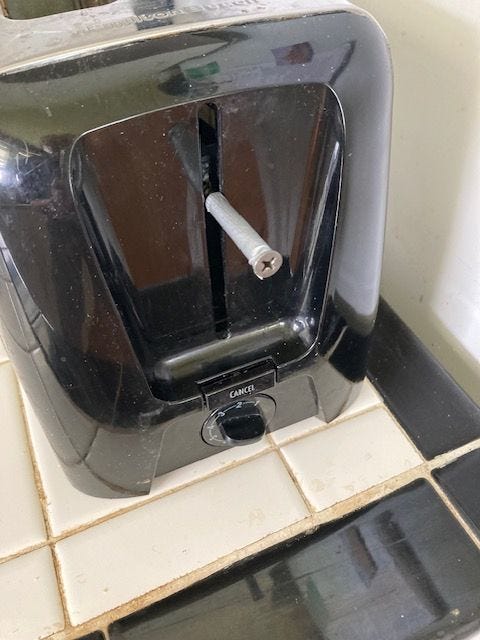The Collapse We Accept Without a Whimper

I considered using the phrase “the decline we accept without a whimper” but concluded that “decline” was sugarcoating the reality that what we’re experiencing across a wide spectrum is collapse, not mere decay or decline. Those phases have already reached fruition, and now we’re in the collapse phase.
Let’s play a guessing game. Which collapse am I referring to? the collapse of affordability? Of public trust in institutions? Or perhaps of customer service, a collapse ably addressed by Quoth the Raven in a recent Substack?
Allow me to offer a few hints about the specific collapse I’m referencing: this list covers the 3.6 years from 2022 to the present (August 2025)
— Samsung range: failed. Stainless steal…
— Kenmore washer: failed. (Electronics)
— Kenmore dryer: failed. (Electronics)
— electric water heater: failed.
— Kenmore refrigerator: failed.
— GE refrigerator: failed in less than 2 years. ($10 fan motor failed, replacement $150)
— Panasonic microwave: rusted junk, failed.
— Zojirushi rice cooker: failed.
— Hamilton Beach toaster: plastic handle snapped off.
— Cutting board fell apart.
— HP laptop, overheated, failed in less than 2 years.
— Goal Zero 400W solar panel failed within a week.
— Canon printer: failed.
— iPhone screen: failed.
— New PRS electric guitar: potentiometer failed.
Yes, I am referring to the collapse of quality across the entire spectrum of products and brands. The decay-decline phase started long ago, but it accelerated when globalization replaced domestic production in the early 2000s.
As late as the early 2000s, you could buy a standard US brand appliance and expect it to last 25 years or longer. Not a luxury brand or the top-of-the-line, just a standard model.
Corners were already being cut: for example, the paint on our Costco-purchased fridge was so thin near the bottom of the appliance that the rust appeared shortly after purchase (mid-2000s).
Now the entire doors of refrigerators rust within a few years. As for “stainless steel,” please cue the laugh-track: “stainless steal” now discolors / rusts within a few years.
The collapse gathered momentum in the mid-2010s, in parallel with the digitization of controls and the cartelization of industries: competition and poor quality ceased to be feedbacks. The only feedbacks now are sales and profits, both of which are admirably boosted by products that fail.
Before you send me an email about your appliance that’s lasted 25 years trouble-free, please note you’re simply proving what I stated earlier: your appliance has lasted 25 years because it was manufactured 25 years ago when durability had not yet nose-dived.
If you want an accurate reading on current product quality, find some independent repair techs and ask for their unvarnished views. Outside of earshot, sales people will also tell you the truth: all brands are now rubbish. Maybe you get a good one, maybe not. If that qualifies as quality, then we’re already in the final stage of collapse.
Electronics routinely fail in virtually every setting: vehicles, appliances, etc. Replacement parts are absurdly overpriced: when the motherboard on the Kenmore dryer (8 years old) failed, the replacement board–a few commodity chips and small circuit boards set in cheap molded plastic, maybe $25 total–cost $180, not far from half the price of a new dryer back then.
Electronics don’t have to be designed and manufactured to fail: my original 1984 Macintosh (assembled in Fremont, California) booted up 20 years later after sitting in a storage box for many years.
As with the collapse of many things in America, one root cause is the concentration of ownership, production and distribution into a cartel of a few firms. The vast majority of major appliances, regardless of the brand, are produced by three global firms: Whirlpool, Electrolux and Haier. The products of all three are rubbish. If you’re lucky, you might get one that lasts 10 years; if unlucky, a few years is all you get.
Cartels dominate banking, Big Tech, healthcare, vehicles, big-box retail, the media, and everything else. Their products and service are rubbish because they know we have no choice.
So all appliances now come with meager one-year limited warranties, and a costly “extended warranty” option–a wink-wink-nudge-nudge-nod-nod that the appliance will fail and so it’s a crapshoot whether it lasts beyond the warranty–or the extended warranty.
As you have heard or experienced first-hand, standard appliances once lasted decades–40 years was not uncommon, and 25 years was considered the minimum acceptable lifespan before any repair would be needed.
Electronics were also durable. my IBM ThinkPad laptop–gifted to me by a friend who’d already used it for years–was only obsoleted by memory-hungry software (the usual trick to obsolete durable hardware).
Some of the appliances on the list lasted 10 years, but again, this is not a victory, it is a collapse compared to what was once expected of moderate-cost commodity appliances. Many failed in a few years. Even the high-end brands failed: the iPhone and Zojirushi rice cooker both failed before their time.
We accept this collapse of quality, the extortion of “extended warranties” and predatory-pricing of replacement parts because… why? Because we have no choice of a product with a 5-year unconditional warranty? Because our political class is owned by cartels and will never bite the corporate hands that feed them?
What if we demanded every product, no matter how modest in cost, had to be covered by an unconditional 5-year warranty? Would our political class listen? Cue the laugh-track.
Would any corporation gut their oh-so profitable cartel arrangement by manufacturing a quality product with a 5-year unconditional warranty? Why would they take the risk when they have a captive audience who accepts the collapse of quality as “the way things are”?
This is how collapse works: like the analogy of the boiled frog, the decay-decline is so incremental we come to accept collapse as “the way it is,” as if there is no other possible trajectory.
Yes, we can resign ourselves to constant repair of rubbish products. But a constant need to repair or replace what fails is the acme of collapse.
Here is my quick-fix of the rubbish toaster handle that snapped off–a drywall screw wrapped in duct tape.

This is a comically low-tech fix for a failure that could have been avoided by spending a few cents on higher quality plastic and steel parts. The point of the repair was to not dump the toaster in the landfill if that could be avoided. Yes, we could afford to buy a replacement toaster, but repairing the rubbish toaster was a modest rebellion against the Waste Is Growth Landfill Economy.
We’re resigned to rubbish products and services and the profitable conveyor belt of products that fail being dumped in the landfill: the Waste Is Growth Landfill Economy.
Filling the landfill with rubbish products isn’t “growth,” it’s the final stage of collapse that we don’t yet see as the final stage of collapse because we mistakenly assume the decay phase is stable and permanent. But decay isn’t a stable state; it’s a trajectory that leads to collapse.
I’m reminded of the Roman elites on their estates in southern France circa the final days of Imperial order, exchanging letters complaining about the decline of the once-predictable Imperial postal service. The letters complaining about the spotty postal delivery service eventually stopped being delivered.
We’re in the final stage of that slow-motion collapse: the last letters complaining about the collapse have been delivered, and those receiving the complaint letters believe their reply letter will be delivered. It won’t, but they don’t know it, for they fell into the recency bias trap, believing that since their letters kept being delivered even as collapse set in, they would continue to be delivered.
That’s how collapse works. The replacement parts are available until they’re not. Those who know how to fix what’s broken are available until they’re not. Things decay but we believe the state of decay is stable. It isn’t.
https://charleshughsmith.substack.com/p/the-collapse-we-accept-without-a
